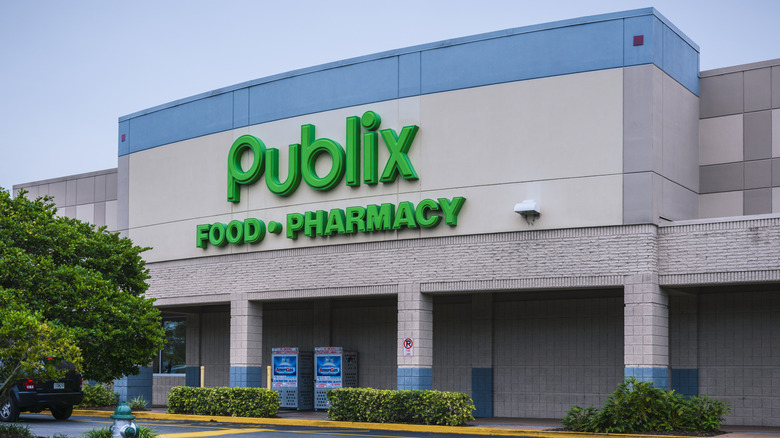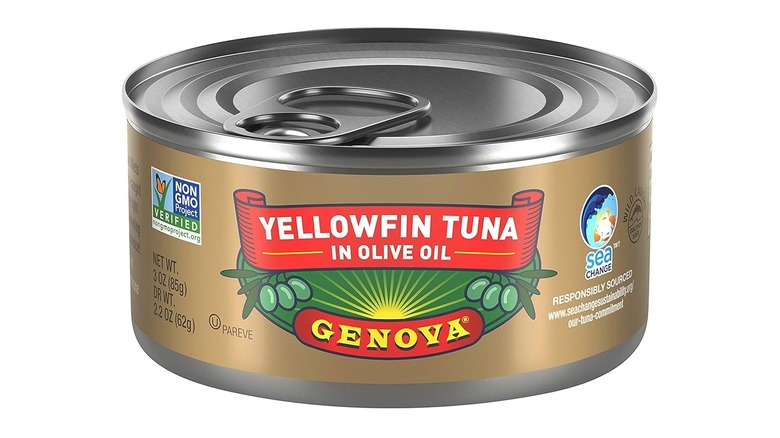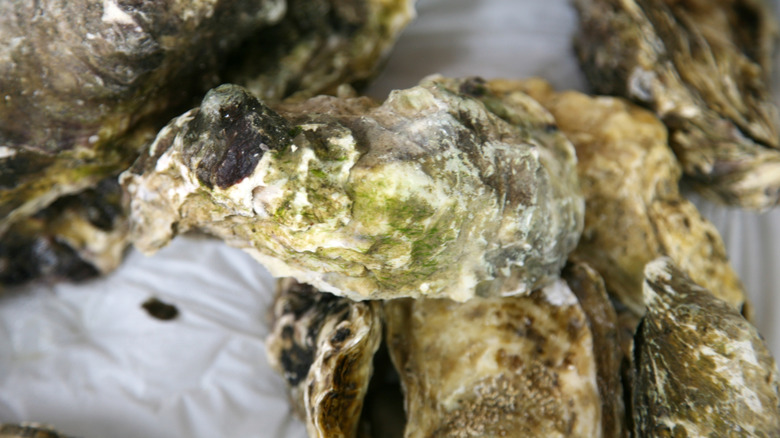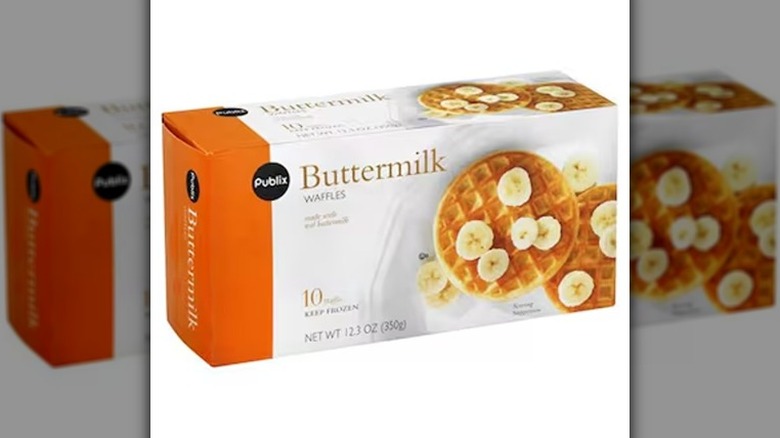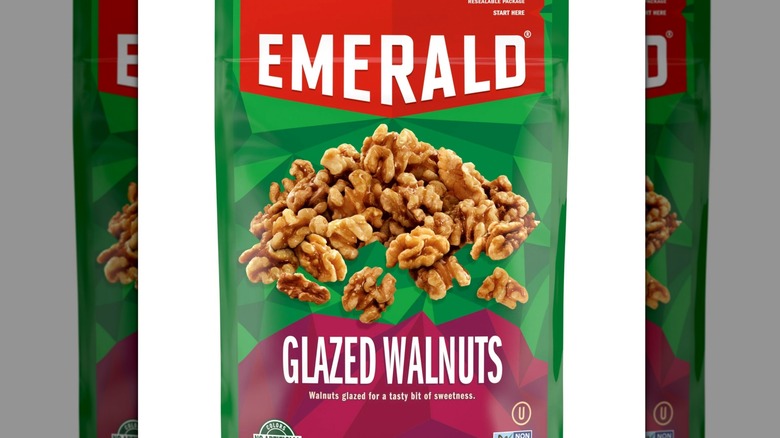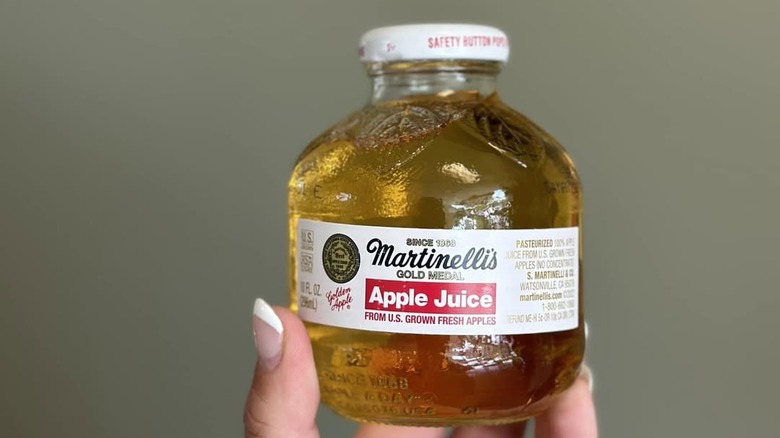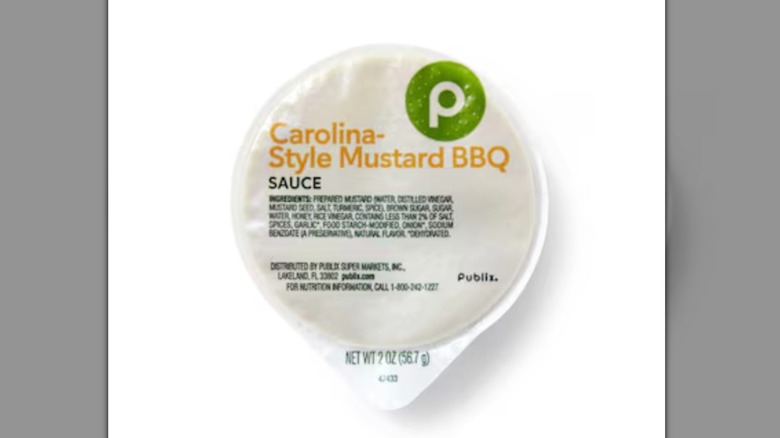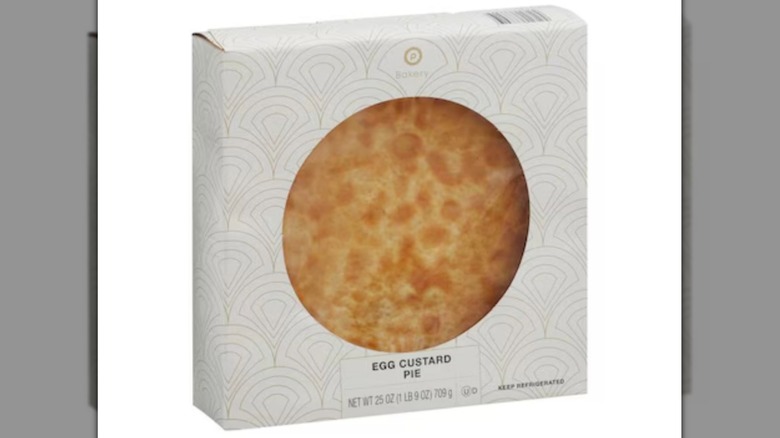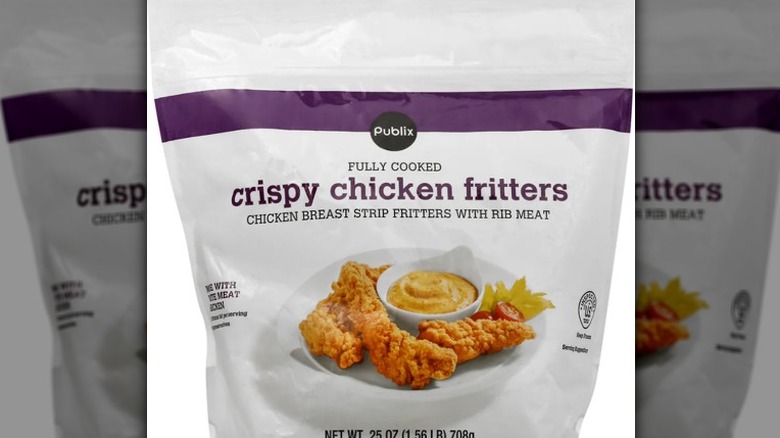Publix Recalls That Affected Millions
We may receive a commission on purchases made from links.
Publix is not only one of America's most beloved grocery stores, it is also one the most trusted grocery stores in America. The grocery chain was founded by George W. Jenkins in Winter Haven, Florida in 1930 and is the largest employee-owned company in the United States as of this publication. With almost 1,400 stores across the Southeast, Publix isn't the largest grocery chain in the U.S., and while that might seem like a bad thing when it comes to response time, the chain's average size is actually a benefit. This is especially true when it comes to recalls which Publix has faced numerous of in the past few years.
Publix is extremely thorough when it comes to ensuring that it handles any and all foods that are not fit for consumers to purchase. The company closely monitors recalls as well as food safety warning announcements so that it can then quickly post any that affect its products to its website and keep shoppers informed. In addition, when a recall impacts its products, Publix has its employees quickly remove them from shelves at affected stores. In spite of all these precautions, Publix has still been caught up in multiple food recalls that have caused its customers to become alarmed and, in some cases, sick. This article will spotlight recalls that affected millions in recent years.
Genova canned tuna products (2025)
In February 2025, a recall at Publix involved two products, one of which was the Genova canned tuna product line. The Food and Drug Administration announced that Tri-Union Seafoods, a manufacturer and distributor of canned seafood, was voluntarily recalling the canned tuna after being informed by its supplier that the "easy open" pull tab on the lid of some of its products were defective. The flaw had the potential to compromise the product's seal, causing it not only to leak but potentially be contaminated with clostridium botulinum — a sometimes fatal kind of food poisoning.
After finding out that the recall affected products it sold in stores, Publix made an announcement regarding the recall and pulled the canned tuna from its shelves. The affected items from the grocer included Genova Yellowfin Tuna in Olive Oil Four-Pack, with the "Best if Used By" date December 13, 2027 and January 21, 2028, and the Genova Solid White Tuna in Olive Oil, with the "Best if Used By Date" December 12, 2027.
At the time of writing, there have been no illnesses in connection with the recall documented. However, symptoms of clostridium botulinum can include noticeable fatigue, weakness, vertigo, blurred vision, abdominal swelling, and other issues. The sickness also has the possibility of progressing, causing weakness in the neck and arms and potentially impacting the respiratory and lower body muscles. The symptoms typically appear within 12 to 36 hours after exposure.
Live, shell-on oysters (2025)
The second recall that affected Publix in February 2025 was for live, shell-on oysters. On February 4, the Louisiana Department of Health announced that it had closed Area 3 — located east of Lake Borgne and north of Eloi Bay — of a molluscan shellfish harvesting area and ordered a recall of oysters harvested from that area since January 10, 2025. The reason behind the recall was that fifteen people became sick, with two even being hospitalized, with norovirus-like symptoms after consuming oysters harvested from that area at New Orleans restaurants between January 15 and January 31. At the time of writing, there have been 266 illnesses reported to the state's health department with cases in Florida, Alabama, Mississippi, and North Carolina.
Publix announced the recall just two days later, letting consumers know which live, shell-on oysters from its store's seafood display cases were affected based on their "Best By" dates. However, the post did not specify in which stores the contaminated oysters were available.
Norovirus is typically referred to as the "stomach flu" due to it causing vomiting and diarrhea. The symptoms of the virus usually begin 12 to 48 hours after exposure and last one to two days. As of February 25, 2025, the Louisiana Department of Health had reopened most of the oyster harvesting in Area 3. However, it left parts of it closed as the molluscan shellfish are being reconditioned until the environmental conditions meet requirements set by the National Shellfish Sanitation Program.
Organic and baby carrots (2024)
In November 2024, Grimmway Farms issued a voluntary recall on organic whole and baby carrots that affected products sold by Publix. The items from the grocer included the one pound bag of GreenWise Baby Carrots, with the expiration date of October 26, 2024, and the one and 25 pound bags of GreenWise whole organic carrots, with the expiration date of October 23, 2024.
The companies recalled the produce due to it being contaminated with Shiga toxin-producing E. coli which can cause severe and even fatal infections in young children, the elderly, and people with compromised immune systems. The Center for Disease Control and Prevention officially announced the end of the outbreak on December 18. From the outbreak, there were a total of 48 illnesses and one death reported across 19 states. Of those cases, 20 led to hospitalizations, and one person developed hemolytic uremic syndrome, which can lead to kidney failure. As of that announcement, the FDA was working with Grimmway Farms to remedy the situation and put up safeguards for the future.
Waffle products (2024)
In October of 2024 TreeHouse Foods announced a recall of its frozen toaster waffles, Belgian waffles, and pancake products that were distributed throughout the United States as well as Canada. While the recall as a whole did consist of pancake and waffle products, the affected Publix products only included its 12.3-ounce Buttermilk Waffles, its 12.3-ounce Homestyle Waffles, its 13.75-ounce Belgian Waffles, and the Greenwise 7.4-ounce organic Multigrain Waffles.
These products were recalled due to them possibly being contaminated with listeria monocytogenes which can cause serious and even fatal effects in children, the elderly as well as those with a weakened immune system. For others it can cause symptoms such as a high fever, severe headaches, stiffness, nausea, abdominal pain, and diarrhea. The infection can also cause pregnant women to have miscarriages and stillbirths.
Luckily, there were no illnesses reported in connection with the recall despite it spanning nationwide and to Canada. All of the affected products came from one manufacturing facility.
Emerald Kettle Glazed Walnuts (2024)
In August 2024, Publix stores in Florida, Alabama, Georgia, and North Carolina were directly affected by a recall issued by Flagstone Foods LLC., the manufacturer of Emerald Nuts, for its 6.5-ounce bag of Emerald Kettle Glazed Walnuts with a specific lot code and the best by date of June 28, 2025. The recall was announced after shoppers in Florida stated that they found peanuts, almonds, and pecans in packets labeled Emerald Kettle Glazed Walnuts.
Publix customers who purchased the walnuts were told to not to open the product and that their options were either to discard the product or return it to the grocer for a full refund. Due to the products containing multiple undeclared allergens the Food and Drug Administration categorized the recall as a Class II severity which on the FDA's website is described as "a situation in which use, or exposure to, a violative product may cause temporary or medically reversible adverse health consequences or where the probability of serious adverse health consequences is remote." Fortunately for Publix and Flagstone Foods there were no reports filed of anyone becoming ill or getting injured from this recall.
Baby arugula (2024)
Green Life Farms issued a voluntary recall in June 2024 for it's four-ounce clear plastic containers of baby arugula that were available at certain Publix stores as of May 31, 2024, with a "Sell By" date of June 15, 2024. The company made the announcement after routine testing one batch of its arugula turned up signs of the presence of Salmonella. The announcement posted to the FDA website stated that the company took immediate corrective action, adding that no other harvests were contaminated.
Shoppers who purchased the contaminated baby arugula were advised to bring it back to the Publix location where they bought it for a refund. People who have contracted a Salmonella infection typically experience diarrhea, abdominal cramps, and fever within 12 to 72 hours after consuming the tainted food and are sick for about four to seven days. Unfortunately, particularly severe cases may require hospitalization. However, this was another recall where the grocer was able to breathe easy after as there was no reported sickness linked to it.
Apple juice (2024)
Publix swiftly responded to a recall issued by Martinelli's in April of 2024 for one lot of its apple juice due to high levels of inorganic arsenic, posting about the recall on its website and informing its consumers before other retailers that were also affected. The Maryland Department of Health was the one who discovered that the arsenic levels in the apple exceeded the FDA's industry action level, which it lowered from 23 parts per billion to just 10 parts per billion in June of 2023. Unfortunately, for Martinelli's samples from a production lot from March 2023, the state's department of health tested came back with an inorganic arsenic level of 11.6 parts per billion — 1.6 parts per billion higher than the actionable level. The lot consisted of 1-liter bottles with the best by date of March 9 or 10, 2026 and was distributed to stores between March 13, 2023 and September 27, 2023.
As part of Publix's duty to its consumers and their safety it quickly spotted the recall and informed its shoppers. Whether it was due to both companies' speedy management of the recall or just a stroke of luck, there were no illnesses reported in connection with the apple juice's high levels of arsenic.
According to the FDA, exposure to inorganic arsenic can cause cancer, diabetes, adverse birth outcomes as well as cardiovascular and neuro-developmental effects. Unfortunately, it's impossible to remove arsenic completely from the environment food supply which is why it sets action levels.
Barbecue sauce (2024)
Over the years, there have also been condiment recalls that affected millions, one of which was Publix Deli Carolina-Style Mustard Barbecue Sauce sold only at Publix locations. Ventura Foods issued a recall for the sauce in January 2024 after it was discovered that the sauce contained Publix's Traditional Sweet & Spicy Barbecue Sauce, which may have contained anchovy. This known allergen that was not listed on the sauce's label and could have posed a possibly life-threatening risk if someone with that allergy consumed the barbecue sauce and experienced an allergic reaction. Fortunately, no one reported any such reactions from the recalled product.
The recall focused on Publix Deli Carolina-Style Mustard Barbecue Sauce with a April 8, 2024 "Use By" date. The sauce was sold at Publix stores in Alabama, Florida, Georgia, North Carolina, South Carolina, Tennessee, and Virginia. Publix quickly removed all of the affected sauce from its stores in these states, and any shoppers who purchased a product that had the impacted expiration date were told to throw it away or bring it back for a refund.
Spinach (2023)
Publix faced another recall due to listeria monocytogenes in December 2023 when, according to the FDA, a test "...yielded a positive result for listeria monocytogenes in a single randomly selected package of spinach." It was the Florida Department of Agriculture who tested the Fresh Express-branded leafy green and discovered the bacteria. The recalled spinach was sent to stores in Alabama, Florida, Georgia, North Carolina, South Carolina, Tennessee, and Virginia, and had the — at the time —already expired, used by date of December 14, 2023.
As with other recalls, Publix quickly removed the packages from its shelves and inventory when the recall was issued. Publix also posted on its website to inform customers of the recall and let them know that the affected products had been used as an ingredient in its famous 'Pub Sub', pizzas, burrito bowls, platters, and even the self-service salad bar from December 5 to December 14, 2023. It also stated that the chicken tacos for two that the retailer sells with the sell by date of December 8 through December 18 were impacted. Despite the recall touching so many of Publix products, the retailer was once again blessed with good fortune as no one reported having any symptoms from the contaminated spinach.
Egg Custard Pie (2023)
Publix had to issue its own voluntary recall in November 2023 when batches of its egg custard pie that were sold at stores in Monroe, Miami-Dade, Broward or Palm Beach counties might have been mistakenly switched with coconut pies. The disguised pies that would have had an undeclared allergen were available at the stores between October 20, 2023 and November 16, 2023. When Publix found out about the possible packaging mishap it quickly removed the baked goods from all of its store shelves.
"To date, there have been no reported cases of illness," said Publix Director of Communications Maria Brous in the FDA announcement that was released. "Consumers who have purchased the product in question may return the product to their local store for a full refund."
It seems that Publix has gotten lucky in the past, since most of its recalls have resulted in no one getting sick. However, multiple recalls adding up over several years, as well as blatant mistakes like this, may have made some customers weary, especially those with a coconut allergy in this case.
Stone fruit (2023)
November 2023 was a stressful time for Publix: Not only was it dealing with its own recall on its egg custard pies, but it also had products impacted by the HMC Farms nationwide and international recall of peaches, plums, and nectarines. These items were sold in Publix and other stores from May 1 to November 15, 2022 and May 1 to November 15, 2023 and were recalled due to being contaminated with listeria monocytogenes.
The stone fruit was sold in bags as well as individual pieces. Although the affected fruit was not being sold in stores at the time of the recall, there were concerns that shoppers may have frozen the fruit for use at a later time, which was why it was pertinent that consumers be informed of the recall.
This was one recall where, unfortunately, the CDC did receive reports of 11 illnesses across seven states which consisted of 10 hospitalizations and, sadly, even one death. The outbreak of listeria monocytogenes was investigated by the FDA and CDC, which confirmed that the listeria strain found at the facility where the stone fruit was packaged was the same strain that was causing illnesses. The CDC ruled that the outbreak was over in January 2024.
Bagged vegetables (2021)
Just two years before the stone fruit recall, Publix had to launch a recall for some of its Publix Steam In Bag products with a certain butternut squash ingredient because they also had the possibility of being contaminated with listeria bacteria. The retailer announced the recall after it was notified about a product recall from its supplier of the ingredient, Pero Family Farms Company.
The affected products included Publix Steam In Bag Green Bean Butternut Squash, Publix Steam In Bag Season Butternut Medley, and Publix Steam in Bag Butternut Brussel Pecan sold from January 3, 2021 to January 14, 2021. The retailer acted fast and removed any potentially contaminated products from its stores and offered refunds to shoppers who had purchased the items, the retailer's Communications Director Maria Brous said in the recall announcement. This was one possible listeria outbreak where, fortunately for Publix its customers, there was no reported sickness or death.
Holiday cookie platters (2020)
To the shock and disappointment of some of its Floridian customers, Publix discontinued its hurricane cakes in 2023 after deciding it didn't want to make light of the natural disasters anymore. However, we are sure some customers — specifically ones with nut allergies — wished that the retailer discontinued its Holiday Cookie Platter instead after an issue with the company's packaging process caused a recall of the product in 2020 due to an undeclared nut allergen.
George DeLallo Co., who makes the platters, recalled the cookies after they were distributed and sold in stores in seven states, including Florida, Georgia, Alabama, Tennessee, South Carolina, North Carolina, and Virginia, with labels that did not disclose pecans as an ingredient. The Publix locations in the Florida counties of Miami-Dade, Palm Beach, Broward, and Monroe were somehow not affected by this recall. Luckily, none of Publix customers became sick from this recall but that doesn't mean that those with nut allergies have forgiven and forgotten.
Chicken strips (2019)
The Takeout determined that the best frozen chicken tenders were Target's Good & Gather which, fortunately for Good & Gather loyalists, was not included in the Tyson Foods recall of chicken strips in 2019. The recall for the ready-to-eat chicken strips was originally issued in March 2019 due to concerns that they were tainted pieces of metal and included 69,000 pounds of affected chicken strips. However, in May, Tyson expanded the recall to include 11.8 million pounds of chicken strip products spanning 11 brands, including Publix's store brand.
The contaminated chicken-strip products were produced at one location from October 1, 2018 through March 8, 2019, and had the "Best By" dates of October 1, 2019 through March 7, 2020. The Food Safety and Inspection Service received six complaints from consumers about the discovery of metal pieces in their chicken strips, with three even alleging that they were orally injured from the trace contents. The Publix stores impacted by the recall were located in Alabama, Georgia, North Carolina, South Carolina, Tennessee, and Virginia.
